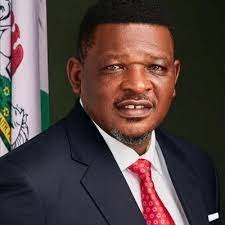OBIORA METU
The Federal Government has signed a 9.3millon euro interconnected mini-grid Acceleration Scheme (IMAS) award grant agreement with eight indigenous Solar Mini-grid developers
Mr Goddy Jedy-Agba, Minister of State, Power disclosed this in a statement by Mr Inyali Peter, his Special Assistant, Information and Communication in Abuja on Thursday.
He said that the agreement was for the development of 2S 3 mini-grids across 11 states of the federation.
He added that the IMAS would generate a 5.4-kilowatt peak to connect about 27,600 households, and impact over 138,000 Nigerians in two years.
“The project is coordinated by the Rural Electrification Agency (REA) with support from the European Union and the German government through the Nigerian Energy Support Programme (NESP),” he said.
Jedy-Agba said that the development was geared towards achieving the country’s vision of generating at least, 30,000 megawatts of electricity by 2030.
The minister commended the management of REA for their efforts and actions toward ensuring that power reaches the off-grid communities in the country.
He noted that the administration of President Muhammadu Buhari was open to opportunities that would achieve the acceleration of electricity in Nigeria.
“According to the developed National Renewable Energy and Energy Efficiency Policy, the vision 30:30:30 aims at achieving 30,000 Mega Watts of electricity by the year 2030 with renewable energy contributing 30 per cent of the energy mix.
” To achieve this, Nigeria will have to construct over a thousand mini-grids of 100 Kilowatts.
“Government cannot achieve the target alone, it is important to continue to find creative and innovative ways to achieve it, and one of which is through collaborating with development partners and the private sector.
“We understand that one of the major bottlenecks for the private sector’s involvement is financing, hence, the reason the NESP and REA have worked closely to develop and implement the Interconnected Mini-grid Acceleration Scheme,” he said.
He listed the local solar mini-grid developers, to include Acob Lighting Technology Limited, Gve Projects, Nayo Tropical Technology Limited, Rubitec Nigeria Limited, Darway Coast Nigeria Limited, Havenhill Synergy Limited
Others are Sosa-Protergia Joint Development Company Limited, and A4&T Power Solutions Limited.
He said that the developers are expected to develop the mini-grids across 11 states which include, Zamfara, Niger, Plateau, Kwara, Kogi, Osun, Ogun, Lagos, Delta, Anambra, and Cross River.
Earlier, the Managing Director of REA, Mr Ahmad Salihijo Ahmad said that the scheme was aimed at bridging the funding gap that was affecting indigenous developers in the renewable energy sector.
Ahmad said: “it is our hope that the signatures we put down today in these documents set a precedent for the new and improved power and energy sector in Nigeria.
“As an agency, we encourage investors to explore the solar mini-grid sector. However, one major constraint to this is usually financing.
“This is why the Rural Electrification Agency, with the support of NESP, is working together to alleviate this bottleneck.
“We do this by providing in-kind grants to selected mini-grid developers on favourable and encouraging terms as contained in the Grant Agreement, “he said.
The MD explained that “the main objective of the intervention is to design and test a tender model for interconnected solar mini-grids, invariably leading to the foundation of the scheme.
According to him, the wonderful thing about the iMAS project is that we have ensured that all the developers are Nigerians.
“This is to say that the Nigerian energy sector has come a long way from what it used to be and we are proud of this, “he said.
Head of programme, NESP, Mr Benjamin Duke, assured that his team would continue to work to build investors confidence in the sector.
“Through developing an accurate electricity market intelligence that will provide investors with accurate data about the country’s electricity needs, ” he said






















